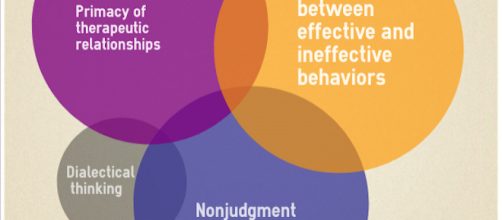As professionals, and as understanding of therapeutic models of intervention grows, new forms of therapy develop. Mental, emotional, and behavioral problems respond differently to different forms of therapy. As such, at times new approaches are necessary to target the areas of concern.
University of Washington researcher of psychology, Marsha Linehan, recognized the need for an innovative form of therapy to treat people with borderline personality disorder and chronic suicidal behaviors. She developed a modified form of cognitive behavior therapy (CBT) called Dialectical Behavior Therapy (DBT) in the late 1980s.
This new therapy integrated the standard CBT emotional regulation techniques with the originally Buddhist meditative practice concepts of distress tolerance, radical acceptance, and mindful awareness. DBT is now considered an effective form of therapy for treating traumatic brain injuries (TBIs), eating disorders, mood disorders, substance abuse disorders, self-injurious behaviors, and sexual abuse trauma. Practicing DBT can provide many therapeutic benefits. It increases self-awareness, controls self-defeating thoughts, modifies thinking, and improves the ability to handle and cope with conflict and stress.
DBT is based on four core principles: the primacy of therapeutic relationships, nonjudgement approach, differentiating between effective and ineffective behaviors, and dialectical thinking.
1. The primacy of therapeutic relationships
In order to build healthy positive relationships, DBT promotes being assertive during interpersonal communication. Using this communication style improves a person's chances of having their own needs met while keeping the rights and boundaries of the other person in the relationship in consideration.
2. Nonjudgement approach
When a person views or approaches a situation with value judgments on whether it's good or bad they are likely to focus on their emotions attached to those judgments rather than neutrally examining the facts. This hinders their ability to positively and productively accept and tolerate the situation.
3. Differentiating between effective and ineffective behaviors
DBT provides guidance in regulating one's emotions and tolerating distress. Remaining mindful of your current emotions reduces your vulnerability to the urges of your emotional mind. These urges may be to engage in ineffective or destructive behaviors. By doing the opposite of the desires of your emotional mind when you are experiencing an unjustified emotion you are more likely to engage in an effective and healthy behavior instead.
4. Dialectical thinking
Dialectical thinking allows an individual to recognize that two different ideas can be simultaneously true. In reality, there is almost always more than one way to see a situation, not one of which is more or less true than the other ways of seeing the same situation.
Keeping your thought processes open-minded provides you with the opportunity to accept that life consists of both comfortable and uncomfortable experiences. The existence of one over the other does not make life all good or all bad.
Embracing the four core principles of DBT challenges people to avoid black and white thinking and seek out alternative views of situations outside of their own understanding. This can expand a person's understanding of the world and can allow them to accept, tolerate, and cope with the way the world is.


